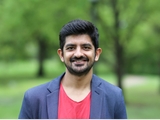GESTAR II members participate in 2023 ECSF at NASA Goddard
On Tuesday, September 19, 2023, the Early Career Scientist Forum (ECSF) 2023 was held at NASA Goddard Space Flight Center, Bldg. 34, Rooms W150 and W120 A/B. The ECSF is "a 1-day AGU style conference for our scientists. The session will be in-person only. Any contractor, civil servant, postdoc, university-affiliated scientist, visiting scientist, or graduate student from the Sciences and Exploration Directorate (SED) can present, and everyone is invited to attend. The objective is to provide a chance for early career scientists to showcase their work, get feedback from other scientists, get to know their peers and to promote future collaboration." Each presentation was 12 minutes long with 3 extra minutes for Q&A. All four SED divisions were represented: Earth Sciences, Astrophysics, Heliophysics, and Solar System, as well as Interdisciplinary. Be on the lookout next fall when the ECSF is usually scheduled to inquire about presenting or attending.
Among the presenters were the following GESTAR II members:
Dhruva Kathuria (610.1/MSU), "Beyond PLSR: Bayesian Brilliance in Hyperspectral Trait Estimation"
Sean Foley (616/MSU), "3D Cloud Structure for Free with Atmospheric Neural Radiance Fields"
Nishan K. Biswas (617/UMBC), "Satellite remote sensing observation based groundwater monitoring over Bangladesh."
According to the NASA Science Career Path Navigator website, "Early level scientists are generally focused on becoming a recognized authority in their area of research. This involves performing research that advances the state of knowledge in an important direction in their field. An early level scientist spends a large amount of time publishing in the peer-reviewed literature and presenting scientific research to domestic and international audiences. They begin establishing collaborations outside their research specialty, and outside their institution. They may contribute to an active mission or project as part of a team, but are not expected to lead. Typically, between 0 and 8-10 years following terminal degree."
Tags:
Posted: September 27, 2023, 11:24 AM
